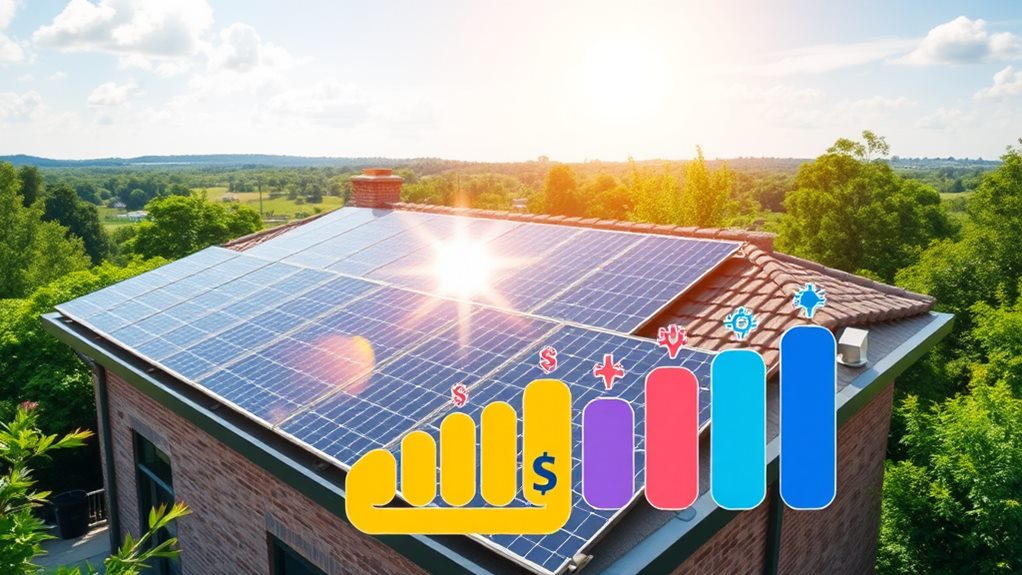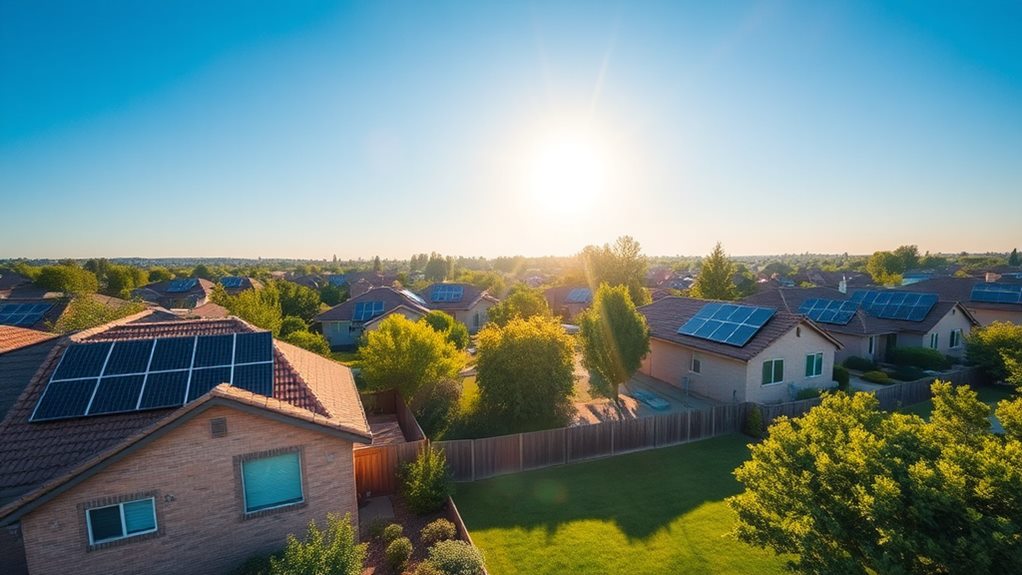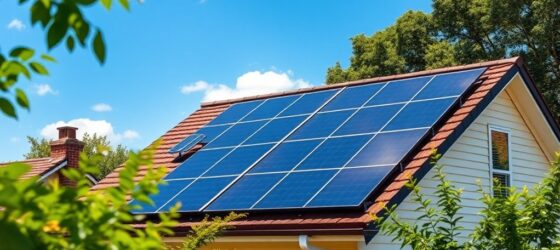The top three advantages of residential solar power are cost savings, environmental benefits, and enhanced energy independence. By installing solar panels, you can reduce your electricity bills by 50-80%, achieving a payback period of just 5-7 years. This not only lowers monthly expenses but can also increase your property value by approximately $15,000. Environmentally, solar energy greatly cuts carbon emissions, promoting cleaner air and water. Finally, generating your own solar power allows you to lessen reliance on the grid, ensuring energy self-sufficiency, particularly during outages. You'll find even more compelling reasons to evaluate solar as you explore further.
Cost Savings

When you invest in solar power, you can start seeing notable cost savings almost immediately. Solar panels have the potential to reduce electricity bills by 50-80%, which considerably lowers your monthly expenses. This immediate reduction is just one of the numerous financial benefits associated with solar energy.
Furthermore, the average payback period for installing solar panels is around 5-7 years, meaning you'll begin to see a return on your investment relatively quickly. Additionally, many buyers focus on long-term savings rather than just upfront costs, allowing for greater financial planning and stability.
In addition to the direct cost savings on your utility bills, there are federal tax credits available that offer a 26% deduction on installation costs, making solar energy more affordable right from the start. Over the long term, savings from solar energy can exceed $20,000 over a 20-year period, providing substantial financial benefits.
Moreover, homes equipped with solar panels typically experience an average increase in property value of about $15,000, enhancing your overall investment returns. By choosing solar power, you not only secure energy independence but also tap into a renewable energy source that promises long-term savings and financial stability.
Environmental Impact
Investing in solar power not only brings notable cost savings but also plays an essential role in reducing your environmental footprint. By harnessing solar energy, you can effectively generate clean energy that considerably lowers carbon emissions. A typical household with solar panels can offset approximately 3-4 tons of carbon dioxide each year, contributing to a substantial decrease in greenhouse gas emissions.
Additionally, the shift towards renewable energy sources helps to support sustainability and creates a cleaner environment for all.
Each solar panel you install can prevent the release of around 100,000 pounds of CO2 over its lifetime. This impact is more than just numbers; it represents a meaningful step in combating climate change. Utilizing solar power diminishes your reliance on fossil fuels, promoting a shift towards a sustainable energy system.
In doing so, you help create a renewable source of energy that's both inexhaustible and environmentally friendly.
Moreover, solar energy systems contribute to cleaner air and water since they produce no harmful pollutants during operation. By generating electricity from sunlight, you're not only investing in your home but also protecting the environment for future generations.
Embracing solar power translates to a positive environmental impact that benefits both you and the planet.
Energy Independence

Energy independence empowers homeowners to take control of their electricity needs by harnessing the sun's abundant power. By installing solar panels, you can greatly reduce your dependence on grid electricity and the unpredictable fluctuations in energy costs.
Generating your own solar energy not only leads to energy self-sufficiency but also guarantees that you have access to electricity during power outages or emergencies, enhancing your overall resilience. Additionally, with various solar energy incentives available, homeowners can lower installation costs and make the shift to renewable energy more affordable.
Moreover, integrating battery storage solutions allows you to store excess energy produced during sunny days for use at night or during cloudy periods, further boosting your energy independence. This capability means you can consume the energy you've generated, giving you greater control over your energy consumption and expenses.
Furthermore, utilizing renewable energy like solar power contributes to national energy security by diversifying energy sources and reducing the reliance on imported fossil fuels.
As a homeowner, embracing solar energy not only benefits your household but also supports a broader commitment to sustainable practices. To summarize, investing in solar panels fosters energy independence, empowering you to make informed choices about your energy future while minimizing your ecological footprint.
Final Thoughts
In summary, embracing residential solar power offers significant advantages, including cost savings, a positive environmental impact, and greater energy independence. Significantly, homeowners can save an average of $20,000 over 20 years through solar energy, making it a financially sound investment. By harnessing the sun's energy, you're not only reducing your electricity bills but also contributing to a sustainable future. As you consider these benefits, remember that shifting to solar power can lead to lasting advantages for both your wallet and the planet.


Recent Comments